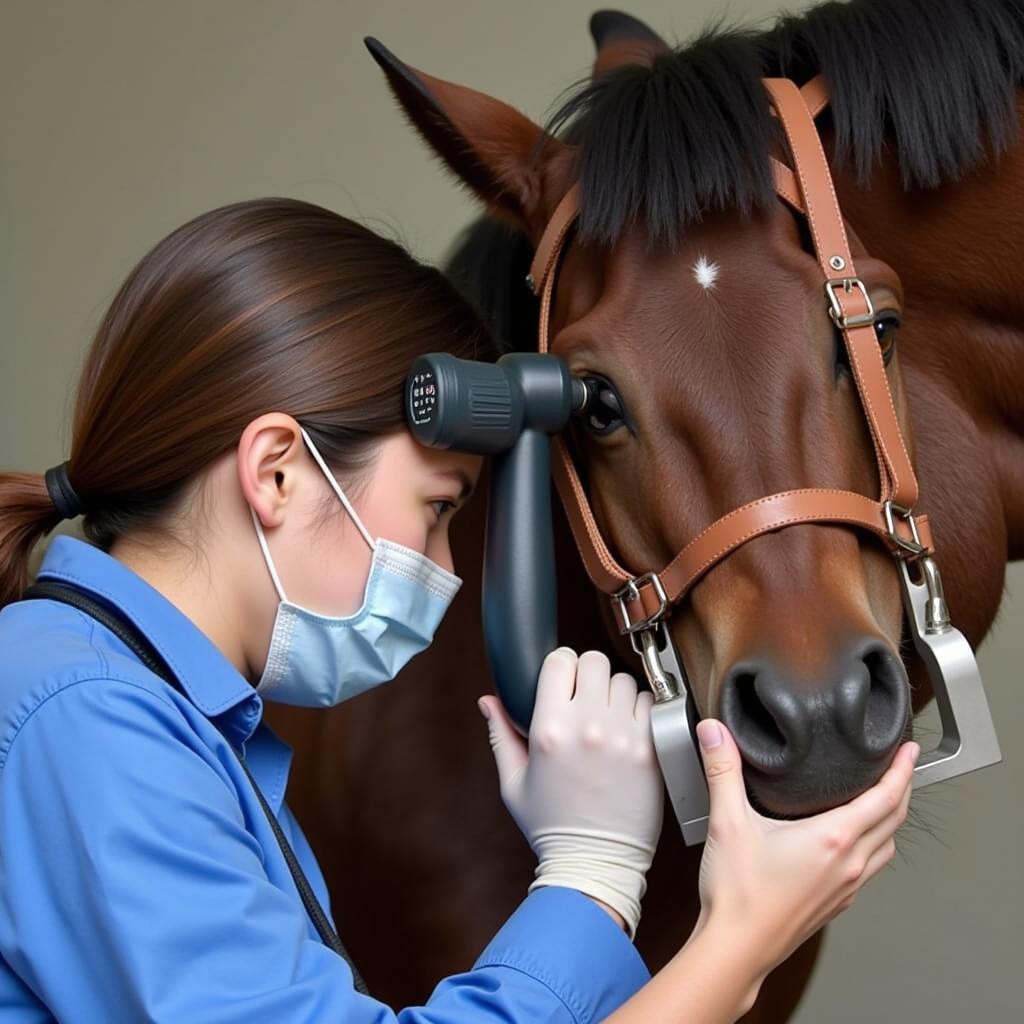The captivating Blue Eye Horse, with its striking and unusual eye color, often sparks curiosity and admiration. These horses, not a distinct breed but rather a characteristic found across various breeds, are truly mesmerizing. What causes this unique eye color, and what are the common misconceptions surrounding blue-eyed horses? Let’s delve into the fascinating world of these beautiful equines. blue eyed horses
The Science Behind the Sapphire Gaze
The mesmerizing blue eyes in horses are a result of a lack of pigment in the iris. Similar to how blue eyes appear in humans, equine blue eyes are often associated with lighter coat colors, such as cremello, perlino, and white. However, certain breeds, like the Appaloosa, can exhibit blue eyes even with darker coats due to specific coat patterns and genetic factors. Understanding the genetic mechanisms behind blue eyes provides valuable insights into the inheritance of this captivating trait.
Common Misconceptions About Blue Eyed Horses
Often, blue-eyed horses are wrongly associated with certain health issues or temperament traits. One such myth is that blue-eyed horses are more prone to blindness. This is not necessarily true. While some specific genetic conditions might correlate with both blue eyes and eye problems, the blue eye color itself does not cause blindness. Another common misconception links blue eyes to a more skittish temperament. Again, this is not inherently true. Temperament is largely influenced by individual personality and training, rather than eye color.
“It’s important to remember that eye color doesn’t dictate a horse’s health or temperament,” says Dr. Emily Carter, DVM, specializing in equine genetics. “Just like with any other horse, individual variations and proper care are key.”
Caring for a Blue Eyed Horse
Caring for a blue eye horse is much the same as caring for any other horse. Providing a balanced diet, regular exercise, and routine veterinary care are crucial for maintaining their overall health. However, due to the lack of pigment, blue-eyed horses might be slightly more sensitive to sunlight. Providing adequate shade or using fly masks for horses with UV protection can help mitigate any potential discomfort or eye issues related to sun exposure.
Breeds Commonly Exhibiting Blue Eyes
While not exclusive to these breeds, blue eyes are more frequently seen in certain horse breeds, including Appaloosas, Paint Horses, Pintos, and horses with diluted coat colors like Cremello and Perlino. The prevalence of blue eyes within these breeds often stems from specific genetic combinations linked to coat patterns and color dilution. For those interested in owning a blue-eyed horse, exploring cremello horses for sale could be a good starting point.
Are Blue Eyed Horses More Susceptible to Eye Problems?
As mentioned earlier, the idea that blue-eyed horses are inherently more prone to eye problems is a misconception. While certain genetic conditions can affect both eye color and eye health, the blue eye color itself isn’t the cause. Regular veterinary check-ups are essential for all horses, including those with blue eyes, to detect and address any potential eye issues early on.
“Regular eye exams are crucial for all horses, regardless of eye color,” advises Dr. Amelia Hayes, equine ophthalmologist. “Early detection and treatment of any eye issues can significantly improve long-term outcomes.”
 Blue Eyed Horse Vet Checkup
Blue Eyed Horse Vet Checkup
Conclusion
The blue eye horse, with its striking appearance, remains a source of fascination. Understanding the science behind this unique trait helps dispel common myths and ensures these beautiful animals receive the proper care they deserve. Remember, eye color doesn’t define a horse; it’s just one aspect of their unique and wonderful nature. Blue eye horse owners should focus on providing a healthy and enriching environment for their equine companions.
FAQ
- Are all blue-eyed horses albino? No, albinism is a different genetic condition. While some blue-eyed horses have diluted coat colors, they are not necessarily albino.
- Can brown-eyed horses have blue-eyed offspring? Yes, if the horse carries the genes for blue eyes, they can be passed on to their offspring, even if the parent has brown eyes.
- Do blue-eyed horses require special feed? No, their dietary needs are the same as other horses, based on their age, workload, and overall health.
- Are blue-eyed horses more sensitive to light? They can be, due to the lack of pigment in their irises. Providing shade and UV protection can help.
- Are blue eyes a sign of inbreeding? Not necessarily. Blue eyes can occur naturally in several breeds without inbreeding. However, inbreeding can increase the likelihood of certain genetic conditions, some of which might be linked to blue eyes.
- Can blue-eyed horses see as well as other horses? Generally, yes. The blue eye color itself does not impact vision.
- Are blue-eyed horses more expensive? Not necessarily. The price of a horse depends on various factors, including breed, training, and lineage, rather than solely on eye color.
You may be interested in our articles about blue eyed horse fly and copper sulfate for horses.
Need further assistance? Contact us: Phone: 0772127271, Email: [email protected], or visit us at QGM2+WX2, Vị Trung, Vị Thuỷ, Hậu Giang, Việt Nam. We offer 24/7 customer support.